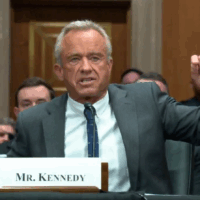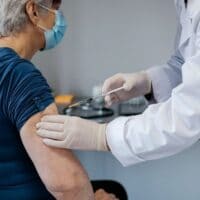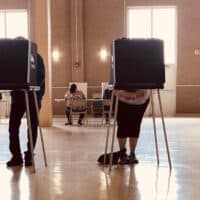(Editor’s Note: The following is a roundup of Kentucky news about the coronavirus compiled for Friday, April 10, by Kentucky Health News.)
Gov. Andy Beshear announced Friday 242 new positive tests for the coronavirus, the largest daily total yet, bringing the state’s corrected total of cases to 1,693.

He reported 11 new deaths, for a total of 90. They were a Butler County man, 77; a Meade County woman, 75; a McCracken County man, 75; a Hopkins County man, 80; a Daviess County man, 81; and six men in Jefferson County, aged 92, 78, 73, 73, 68 and 66.
Asked why the state’s death rate is higher than the national rate, Beshear said, “We are truly testing the very sickest right now,” and are so short of test kits that people who have been mildly symptomatic and wanted to be tested we asked to “ride it out without a test.”
Also, he noted, “We in Kentucky are not as healthy as we need to be,” with some of the nation’s highest rates of diabetes, heart disease and cancer, conditions that make COVID-19 deadlier.
As of Friday at 5 p.m., Kentucky had confirmed tests of 24,288 patients with 1,693 confirmed positive tests and 90 confirmed deaths, a death rate among positive cases of 5.3 percent.
In other news:
- Beshear said 459 Kentuckians have been hospitalized with COVID-19 and at least 271 still are. He said at least 177 have been in intensive care, and at least 105 are now. At least 464, or 27 percent of the total, have recovered, he said: “That is real positive news already, and we believe that number is larger.”
- He reported three new cases each at Green River Correctional Complex in Central City and Western State Hospital in Hopkinsville.
- Asked about automobile dealers doing test drives, he said “Auto dealers should not be having any face-to-face contact with people.” He said his order to that effect “made me very unpopular with auto dealers that I know.”
- Told about a Louisville mobile-home park that had charged non-paying renters a $100 late fee and threatened them with eviction, contrary to his order, Beshear said, “We need people to better and kinder and more compassionate for us to get through this.”
- Norton Healthcare is the latest Kentucky hospital system testing treatment of COVID-19 with plasma taken from blood donated by fully recovered patients. The treatment “is available only to patients who are severely ill from the disease,” Norton says. “Convalescent plasma has been used over the past several years to treat severe illnesses such as severe acute respiratory syndrome (SARS), avian influenza and Ebola virus.” The novel coronavirus is SARS-CoV-2.
- Senate Majority Leader Mitch McConnell announced that over 3,900 Kentucky health-care providers will get nearly $453 million from the first distribution of the $100 billion appropriated by the Coronavirus Aid, Relief, and Economic Security (CARES) Act, based on their share of certain 2019 Medicare reimbursements. “This is the most significant discretionary funding source available directly to hospitals and providers in modern times,” McConnell’s news release said. This first allotment of funding will be distributed among more than 3,900 Kentucky medical providers and systems. Future distributions of funding to Kentucky will follow different metrics established by HHS.
- To get the money, providers must agree not to “surprise bill” COVID-19 patients. “Providers are required to sign the terms and conditions within 30 days of receiving CARES Act funding or return the funding,” Inside Health Policy reports.
- For McConnell, the pandemic recalls his battle as a toddler to beat polio, for which there was no vaccine until he was 12, reports Lisa Mascaro of The Associated Press.
- Sen. Rand Paul told the Bowling Green Daily News that he had no symptoms of COVID-19 after testing positive for the coronavirus and self-quarantining for two weeks, and now has immunity to it, so he is volunteering at TriStar Greenview Regional Hospital.
- Kentucky acted early to thwart the virus, but Ohio acted even earlier, canceling a big event even before it confirmed a case, and The Washington Post holds it up as a good example: “In the Cincinnati [hospital-referral] region, models now show that peak occupancy of hospital beds by COVID-19 patients may be just 10 percent of the predicted worst-case scenario.”





